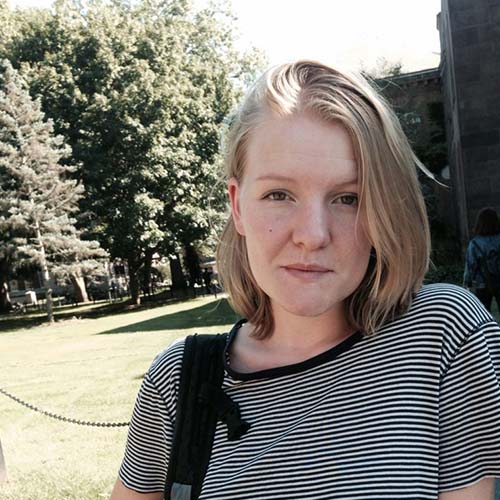Alumnae Poets
Marney Rathbun '16
Select Poems
mark meets his daughter
i saw her like the first lightning
waking up on the first morning
a glory born forest a fire
on the kitchen table the only thing
i could see for hours and this is
the rest of your life i thought and
red was not the color of her hair
not burning skies or velveteen or
deepening or the face of my heart
in the face of this child no her
hair was the plush flesh of a peach
this my daughter there i
imagined her into existence
and now pink infant here
i dont need a drink drunk is
9 pounds and 21 ounces of
new not amsterdam just new
this is the first moment i’ve
ever been alive the reason i didn’t
let them kill me this baby my girl
this love might kill me
From I CALL MY FATHER BY HIS NAME (Jubilat, 2016)
I.
My mother wants me to marry
a man of local origin. Nothing
about him matters – he could be a basket
of balloons and screws – but that
he live close. He invite me to live
closer. Somedays, I am confused
for a neon mouth. To hide, I stuff
my mother in my ears. She speaks.
I want to live closer to her voice –
which opens and whacks
me around. Which, one night, asks
for natural grandchildren. Sperm-meets-embryo
hope. She says it over dinner: cole slaw,
sausage, potato buns in a fought-over toaster.
My mother is often cutting dark blue
cabbage. She eats beets. Our cutting boards,
pre-oiled, stain indigo.
II.
It is Sunday. I am nannying a baby
named Stefan. He is becoming a house –
remember how it felt to become
a house – and screaming
at the columns rising
in his mouth, which is open and shaking.
I want to kill him. There is a fireplace,
a rack of wrought iron tools.
I consider the window, the ten ways
I could do it. To stop myself, I call my mother.
Who has not spoken since that
natural-child remark. My furious,
homophobic mother. Who wants me
to make life with a man. Who lets
vegetables dye the counter
when I am gone. Who lives a huge
and hurtful life, the edges of which
I envy. I want to make it easy.
I want to look into her closet
and see how she folds
her camisoles. My mother,
who on the phone confesses
when I was new, she could not be near
the knives in their block. She could not
even enter the kitchen.
His back in its sweater beads into sweat
but he likes the sweater – it reminds him
of his grandmother, who splashed lukewarm tap
water into her scotch. Manhattan nights,
she shook n’ flicked two Sweet n’ Lows into
her coupe. We come back to booze.
Mark boils water so he doesn’t pour
wine. It could happen many ways, any
night of the week. A faucet taut to leak.
He sweats, he is hot, he is hardly not
drinking. He needs a cup to hold bacon
grease. Did I say he is frying bacon?
The Bud pops
and pours out. Sweetwater tossed to the drain
as if spoilt. If only it could, all
the liquor alive, rancify and sour.
Mark barely tips the cast-iron fryer
to transfer its meat fat to the can.
A thick glug of gold. I have no fine phrase
for the shaking of his hand.
My poor, frightened father.
Where is faith when he stirs honey into
tea? When he quietly removes his shoes
and sits to face tv, back taut in grim
refusal – where is praisesong for
his insular no’s, for his muscular
memory of four-to-six second
pour, sown as the thumb flip of clove-hitch
knots, ignored? He lifts the BLT –
he eats. That sweet meat. That sweating man. Look
at him do the thing he does not want to
fail at. Praise him for it.

